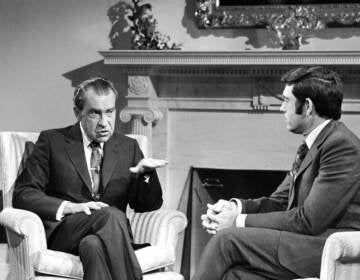How we’re cheapening the value of words in the age of exaggeration
Look for a raft of fresh metaphors when the new Congress is seated in January.

An Oxford English Dictionary is shown at the headquarters of the Associated Press in New York. (AP Photo/Caleb Jones, file)
If undeserved adulation is the order of the day, I got my dose in a recent mailing from Verizon.
“Thank you for being phenomenal,” it gushed.
It would be wonderful to say that I had cured Alzheimers’s disease, parted the waters of the Red Sea, or run a sub-10-second 100-yard dash in the Senior Olympics. Not quite.
I was being honored for bundling my internet, cellphone and cable television service, something I had done years ago.
I wonder how many other patrons of the communications giant got this same mass-mailed plaudit – and feel as I do that such self-serving commendations have not only cheapened the language, but also the value of praise itself.
We all have people in our lives – the coach, the boss, the teacher, the father – whose compliments were valued precisely because they were so rare or grudging. They’re easily remembered, not only for their simplicity (“you did well” or “nice job”), but also because they were hard earned. If phenomenal ever passed our lauder’s lips, it was in a moment of sarcasm.
To be fair, Verizon is not the outlier here. These days, empty superlatives infect journalism, politics, entertainment, conversation. I call it the hyperbolic chamber. Its sibling is the metaphoric disorder.
When the New York Times published an anonymous op-ed criticizing President Donald Trump this summer, the aptly named Wolf Blitzer of CNN sounded like a war correspondent: “The White House is shell-shocked by the anonymous bombshell.” Time to hunker down in the trenches.
It also seems that news isn’t news unless it portends Armageddon. Here is Reza Pahlavi opining about Iran in the Wall Street Journal, “[The Islamic Republic] poses an existential threat to Iran and its people.” He added that Iran faces “multiple existential challenges simultaneously.”
Did Jean-Paul Sartre have any idea of the monster he created?
The overkill extends to books as well, where the need to pack in maximum horror has turned into an arms race over titles. How about this current one from author Robert Rand: “The Menendez Murders: The Shocking Untold Story of the Menendez Family and the Killings that Stunned the Nation.” Some perspective here: The murders occurred 29 years ago.
Two adjectives have become essential ingredients in this copycat language: dark and deep.
We have dark money and the dark web. Maureen Dowd of the New York Times has described the Trump White House as “the dark alternative universe. The Meriden (Connecticut) Record-Journal described the same as “a dark labyrinth where rules don’t apply and some vacant concept of winning seems attainable.” We even have a nonfiction best-seller in Michelle McNamara’s “I’ll Be Gone in the Dark.”
Deep is a first cousin. From the Wall Street Journal’s Kimberley Strassel, we have “… in this new era of social media deep-diving, no one’s past is safe from scrutiny.” An Inquirer story portrays an Ohio congressional district as deep red. And Curt Schilling pitched this theory in a June podcast: “I don’t think we can deny anymore that the deep state exists.” In case you’ve forgotten, he’s the guy who used to go deep into the seventh inning for the Phillies.
Study the language of journalism closely, and you’ll detect a hierarchy of impact. When a proposal is going nowhere, it’s a “non-starter.” If it has legs, it’s a “game changer.” A few steps up the ladder, it becomes something that “changes the culture” or perhaps “redefines” it.
The favorite is contained in Adam Tooze’s recent book, “Crashed: How a Decade of Financial Crises Changed the World.”
A quick Google search also reveals “The Boy Who Changed the World” and “Fifty Cars that Changed the World.” Expect more such titles — as well as a raft of fresh metaphors too when the new Congress is seated in January.
A while ago, “thinking outside the box” was in vogue. Its shelf life has expired, but the replacements have become equally tiresome.
My plea: Could we please acknowledge that the “tools in the toolkit” have become so shopworn that they are dull beyond repair?
And could we leave the goalposts where the NFL put them in 1974 instead of saying that Rudy Giuliani has moved them again and again in the eternal White House back-and-forth with Robert Mueller?
Bob Martin (Tango.close@verizon.net) is a former Philadelphia Inquirer editor and writer.
WHYY is your source for fact-based, in-depth journalism and information. As a nonprofit organization, we rely on financial support from readers like you. Please give today.




